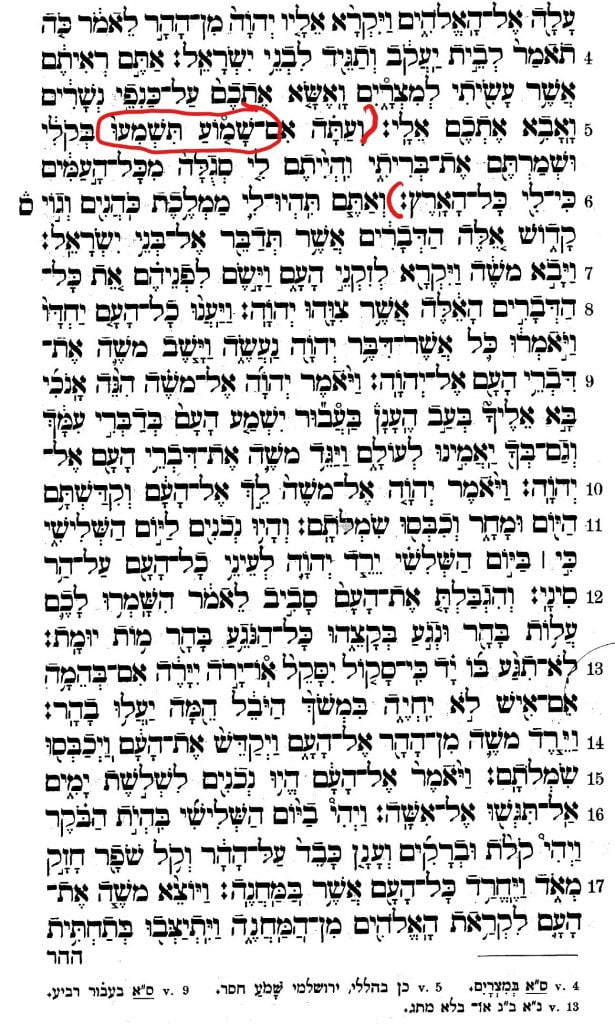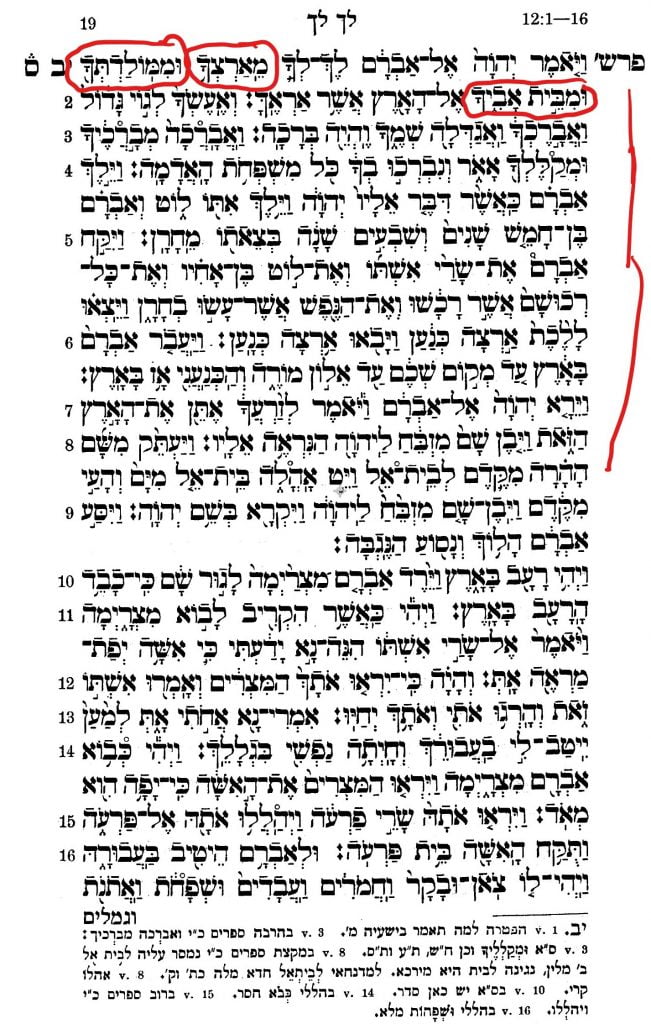All Torah portions, videos, and audio files for this series located here.
In this week’s Torah Portion, Parashat Lech Lecha, the Lord God told Abram that He wanted him to get up and leave the land of his birth place and go to a land that he will show him. (אֶל-הָאָרֶץ אֲשֶׁר אַרְאֶךָּ) The Torah also reveals to us there were ten generations from Noach to Abram. It was quite some time until the Lord had revealed Himself to men on earth again. As we read through this week’s Torah portion, we learn of how great was Abram’s love of God as he seemingly unquestioningly listens to what God had asked him to do. When Yeshua was asked what the most important commandment of the Torah was, what the Lord expects of us, Yeshua’s response was Devarim / Deuteronomy 6:4 “Shema/Hear O Israel, the Lord our God, the Lord is one.” (שְׁמַע יִשְֹרָאֵל יְהוָֹה אֱלֹהֵינוּ יְהוָֹה | אֶחָד, Mark 12:29) The greatest command of all in the Torah is Shema (“listen”) because when we sincerely listen to the Lord God, we surrender our lives to Him. In the Masoretic text, the Scriptures do not use the Hebrew word Shema to indicate that Abram “listened” to the word of God. We are told that He packed up himself and his family and traveled to the land which God was going to show him. Shema (שמע) “to listen” means to obey God’s commandments. In Hebrew, listening and doing are two sides of the same coin. This is what we learn according to Shemot / Exodus 19:5.
Shemot / Exodus 19:5
ה וְעַתָּה אִם-שָׁמוֹעַ תִּשְׁמְעוּ בְּקֹלִי וּשְׁמַרְתֶּם אֶת-בְּרִיתִי וִהְיִיתֶם לִי סְגֻלָּה מִכָּל-הָעַמִּים כִּי-לִי כָּל-הָאָרֶץ:
19:5 ‘Now then, if you will indeed obey My voice and keep My covenant, then you shall be My own possession among all the peoples, for all the earth is Mine;

This is a direct connection here back to Parashat Lech Lecha as the text speaks of “listening” (שָׁמוֹעַ) and “obeying” (תִּשְׁמְעוּ). These things reveal to us how in the Scriptures listening and obeying are intimately linked, and what we see going on in Abram’s life is a warning to us that heeding the messages of this corrupt world can make us into an enemy of God Himself (see James 4:4). Listening to other voices (regardless of how seemingly well-intended) puts you at risk of becoming deafened to the Voice of Truth (i.e. Liberal idealogies).
Bereshit / Genesis 12:1-7
א וַיֹּאמֶר יְהוָֹה אֶל-אַבְרָם לֶךְ-לְךָ מֵאַרְצְךָ וּמִמּוֹלַדְתְּךָ וּמִבֵּית אָבִיךָ אֶל-הָאָרֶץ אֲשֶׁר אַרְאֶךָּ: ב וְאֶעֶשְֹךָ לְגוֹי גָּדוֹל וַאֲבָרֶכְךָ וַאֲגַדְּלָה שְׁמֶךָ וֶהְיֵה בְּרָכָה: ג וַאֲבָרְכָה מְבָרֲכֶיךָ וּמְקַלֶּלְךָ אָאֹר וְנִבְרְכוּ בְךָ כֹּל מִשְׁפְּחֹת הָאֲדָמָה: ד וַיֵּלֶךְ אַבְרָם כַּאֲשֶׁר דִּבֶּר אֵלָיו יְהֹוָה וַיֵּלֶךְ אִתּוֹ לוֹט וְאַבְרָם בֶּן-חָמֵשׁ שָׁנִים וְשִׁבְעִים שָׁנָה בְּצֵאתוֹ מֵחָרָן: ה וַיִּקַּח אַבְרָם אֶת-שָֹרַי אִשְׁתּוֹ וְאֶת-לוֹט בֶּן-אָחִיו וְאֶת-כָּל-רְכוּשָׁם אֲשֶׁר רָכָשׁוּ וְאֶת-הַנֶּפֶשׁ אֲשֶׁר-עָשֹוּ בְחָרָן וַיֵּצְאוּ לָלֶכֶת אַרְצָה כְּנַעַן וַיָּבֹאוּ אַרְצָה כְּנָעַן: ו וַיַּעֲבֹר אַבְרָם בָּאָרֶץ עַד מְקוֹם שְׁכֶם עַד אֵלוֹן מוֹרֶה וְהַכְּנַעֲנִי אָז בָּאָרֶץ: ז וַיֵּרָא יְהוָֹה אֶל-אַבְרָם וַיֹּאמֶר לְזַרְעֲךָ אֶתֵּן אֶת-הָאָרֶץ הַזֹּאת וַיִּבֶן שָׁם מִזְבֵּחַ לַיהוָֹה הַנִּרְאֶה אֵלָיו:
12:1 Now the Lord said to Abram, ‘Go forth from your country, And from your relatives And from your father’s house, To the land which I will show you; 12:2 And I will make you a great nation, And I will bless you, And make your name great; And so you shall be a blessing; 12:3 And I will bless those who bless you, And the one who curses you I will curse. And in you all the families of the earth will be blessed.’ 12:4 So Abram went forth as the Lord had spoken to him; and Lot went with him. Now Abram was seventy-five years old when he departed from Haran. 12:5 Abram took Sarai his wife and Lot his nephew, and all their possessions which they had accumulated, and the persons which they had acquired in Haran, and they set out for the land of Canaan; thus they came to the land of Canaan. 12:6 Abram passed through the land as far as the site of Shechem, to the oak of Moreh. Now the Canaanite was then in the land. 12:7 The Lord appeared to Abram and said, ‘To your descendants I will give this land.’ So he built an altar there to the Lord who had appeared to him. (NASB)

Here we see how God had called Abram from the land of his people. It is interesting how the text states in Bereshit / Genesis 12:1, וַיֹּאמֶר יְהוָֹה אֶל-אַבְרָם לֶךְ-לְךָ מֵאַרְצְךָ וּמִמּוֹלַדְתְּךָ וּמִבֵּית אָבִיךָ אֶל-הָאָרֶץ אֲשֶׁר אַרְאֶךּ the way the sentence is written, it says that the Lord said unto Abram to go from your land (מֵאַרְצְךָ), and then also sates, from the land of your birth (וּמִמּוֹלַדְתְּךָ), and then goes even further to say, from the house of your father (וּמִבֵּית אָבִיךָ). Why do you think the Lord needed to add these additional things to his statement (לֶךְ-לְךָ מֵאַרְצְךָ)? Surely one would think that leaving one’s country meant that he would also be leaving his fathers house and the place of his birth, right? The commentary Or HaChaim on Bereshit / Genesis 12:1-4 states that it would have been painful to leave one’s family. This shows the measure of faith that Abram had in pickup up all that he owned and moving. If we look closely, there is this description in the Hebrew text of the increasing difficulty of complying with God’s command as we grow in our relationship with him, illustrated when the Lord God told Abraham to take “your son, your only one, the one you love,” as an introduction to the עֲקֵידַת יִצְחַק (Akedat Yitzhkak) in Bereshit / Genesis 21:2. These things beg the question of who are we listening to in our lives?
Midrash Rabbah states that the ear (אזן) gives life to all the organs of the body. How is this possible? Paul explains the Shema (שמע, listen) in the Torah to be very significance when he said “Faith comes by listening to the Word of God.” (Romans 10:17) This means that the Word of God (דבר האלוהים) is our life. This draws us back to this concept of who do we listen to? Do we listen to liberal ideologies? Listening to other voices (regardless of how well intended) means that we cut ourselves off from the source of life itself. This is why listening and obeying are linked because what we listen to, and what we entertain in our minds, such as the corrupted messages of this world, can eventually make us an enemy of God Himself!
This concept is further illustrated in the life or Abram and Lot. Notice something, while reading the narrative, we see how Abram added to his numbers. He was the kind of person who talked to others about the Love of the One true God. As a person who lives his life this way drawing people to himself, it is unusual that he would push someone away, as we read in the story of Abram and Lot parting ways. Abram said “if you want to go to the right, I will move to the left; if you want to move to the left, I will move to the right.” Abraham was humble and allowed Lot to choose what direction to he wanted to go. Notice something here in the narrative. The Lord did not communicate with Abram for some time until he had parted ways with Lot (Bereshit / Genesis 13:14). Specifically, the Lord did not show Abram the entire extent of the land that He would give him until Lot was gone. The Lord delayed fulfilling the last part of His promise until Lot was gone. Lot then chose the low laying lands that was full of corruption. The end result was Lot listening to the people of that culture caused ruin and loss of all that he had. These things illustrate for us how we are to listen to God and His Word alone! The world always speaks its message to those who are willing to listen to its “crooked and twisted generation” (Devarim / Deuteronomy 32:5, see Parashat Haazinu). Consider something, this is how politicians today gain their audiences! What then does this say about our culture? These things speak to the significance of what we are studying here on the life of Abram and how he lived by his faith.
The Talmud goes on to say the following concerning Bereshit / Genesis 12:3 (וַאֲבָרְכָה מְבָרֲכֶיךָ וּמְקַלֶּלְךָ אָאֹר וְנִבְרְכוּ בְךָ כֹּל מִשְׁפְּחֹת הָאֲדָמָה).
Talmud Bavli Berakhot 55a:8
The Gemara details the biblical sources for these cases: One who is given the Torah scroll to read and he does not read, as it is written of the Torah: “It is your life and the length of your days” (Deuteronomy 30:20). A cup of blessing over which to recite a blessing and he does not recite a blessing, as it is written: “I will bless them that bless you” (Genesis 12:3); one who blesses is blessed and one who does not bless does not merit a blessing. And with regard to one who conducts himself with an air of superiority, as Rabbi Ḥama, son of Rabbi Ḥanina, said: Why did Joseph die before his brothers, as evidenced by the order in the verse: “And Joseph died, and all his brethren, and all that generation” (Exodus 1:6)? Because he conducted himself with an air of superiority, and those who did not serve in a leadership role lived on after he died.
The Gemara is discussing the verse on the blessing, and speaks of how the Torah states how the Word of God “It is your life and the length of your days” (Devarim / Deuteronomy 30:20). The rabbis in the Talmud go on to speak of reciting the blessing, which may be interpreted as when one is not a blessing to others, one does not merit being blessed, and then discusses the issue of pride. Having an air of superiority over others leads to an early death. Note how liberal ideologies tend to facilitate these things.
Another interesting bit of truth that we receive from this week’s Torah portion is in how the Lord God had revealed himself to Abram. In the subsequent generations, the Lord did not reveal Himself in the way that He had revealed Himself to Abram. What this teaches us is the reason may be that the children were born into an environment of sanctity meaning that they were raised to believe in God (Or HaChaim on Genesis 12:1 Part 2). As a result, the subsequent generations knew of the Lord and so He communicated with His people without the visions that Abram had received. These things illustrated how important it is to raise our children to know the Lord. Reading to them from the Scriptures, praying with them so they would know how to pray, and leading them to do what is right.
All of these things illustrate the greatest command that we are to teach our children, that is to listen, as we see according to the Shema in Devarim / Deuteronomy 6:4. We bring greatness to the God of Israel by keeping His words in our hearts believing upon Yeshua His Messiah. We are told to take hold of the truth, to gain the knowledge of God’s Word, and to find the spiritual insights that guide us to walk in His ways. Based upon what we read in the opening verses in Parashat Lech Lecha (Bereshit / Genesis 12:1-5) we learn how God called Abram and how he would benefit spiritually by his picking up all that he had and moving to where the Lord was calling him to go. It is interesting according to Tehillim / Psalms 75:7 we read כִּ֤י לֹ֣א מִ֭מּוֹצָא וּמִֽמַּעֲרָ֑ב וְ֝לֹ֗א מִמִּדְבַּ֥ר הָרִֽים׃ “For what lifts a man comes not from the east or the west or the wilderness;” The rabbis say (Or HaChaim on Bereshit / Genesis 12:1 Part 6) in every place that the word הָרִֽים׃ (mountains) is written in the Scriptures it means mountains except here in Tehillim / Psalms 75:7. In this case the rabbis say this refers to a spiritual uplift. It is the Lord God Almighty who uplifts a man in both his heart and in his situation in life. These things happen only when we step out in faith as Abraham did, when we shema (listen and obey).
Genuine listening is an act of creation in the sense that we are moved to trust and walk in God’s Word. This is what it means to set boundaries that are godly. For example, it is not loving to gossip, slander, abuse, or be vane, the Lord expects us to do what He does, and he does not want us to do something He does not do. We are urged by the Holy Spirit to heed the voice of God. When we do, the Lord will do great things. The Mishnah Pirkei Avot 4 Part 1 states the following:
Mishnah Pirkei Avot 4:1
Ben Zoma said:Who is wise? He who learns from every man, as it is said: “From all who taught me have I gained understanding” (Psalms 119:99). Who is mighty? He who subdues his [evil] inclination, as it is said: “He that is slow to anger is better than the mighty; and he that rules his spirit than he that takes a city” (Proverbs 16:3). Who is rich? He who rejoices in his lot, as it is said: “You shall enjoy the fruit of your labors, you shall be happy and you shall prosper” (Psalms 128:2) “You shall be happy” in this world, “and you shall prosper” in the world to come. Who is he that is honored? He who honors his fellow human beings as it is said: “For I honor those that honor Me, but those who spurn Me shall be dishonored” (I Samuel 2:30).
The Mishnah Pirkei Avot teaches that it is important for us to listen to the lives of others for the purpose of learning. In fact, it is possible to learn from every man, whether a man is righteous or unrighteous. The rabbis say that the one who is great is he who subdues the Yetzer Hara, the evil inclination such that he is slow to anger. They go on to say that he who rules his own spirit is better than the mighty one who is able to take a city. This is a significant statement as today, the time is short and the days are evil. How easy is it for us to be distracted from the things of God by worldly activities, sports, television, etc? The Mishnah also states that he who rejoices in his lot is rich. Paul wrote something similar saying,
Philippians 2:13-16, 4:4-9
2:13 for it is God who is at work in you, both to will and to work for His good pleasure. 2:14 Do all things without grumbling or disputing; 2:15 so that you will prove yourselves to be blameless and innocent, children of God above reproach in the midst of a crooked and perverse generation, among whom you appear as lights in the world, 2:16 holding fast the word of life, so that in the day of Christ I will have reason to glory because I did not run in vain nor toil in vain. (NASB)
4:4 Rejoice in the Lord always; again I will say, rejoice! 4:5 Let your gentle spirit be known to all men. The Lord is near. 4:6 Be anxious for nothing, but in everything by prayer and supplication with thanksgiving let your requests be made known to God. 4:7 And the peace of God, which surpasses all comprehension, will guard your hearts and your minds in Christ Jesus. 4:8 Finally, brethren, whatever is true, whatever is honorable, whatever is right, whatever is pure, whatever is lovely, whatever is of good repute, if there is any excellence and if anything worthy of praise, dwell on these things. 4:9 The things you have learned and received and heard and seen in me, practice these things, and the God of peace will be with you. (NASB)
This idea of rejoicing always and not doing things with grumbling and disrupting is similar to the Mishnah comment of rejoicing in our lot. This means we rejoice in what God has given us and glorify His name. Paul writes this is so that we may prove ourselves to be blameless, innocent, and above reproach as the children of God. Paul also suggests this is the approach we take to be truly thankful and at peace when making requests in prayer. Genuine listening will result in our being moved to trust and walk in God’s Word. The Scriptures tell us that there will be a day of reckoning and on that great day everyone will be exposed for who they are. The truth of what we worship will be made manifest, all will see, and we will all give an account for how we spent our time, our lives, and what message we listened to and what we believed by the way that we live our lives. These are the things that Abram reveals to us by His faith! These are also the things both Yeshua and his disciples taught, we are to hear/listen to the Word of God and seek His help to bring glory to the Name of the Lord by bearing His testimony according to the Scriptures!









